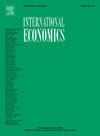Navigating competitiveness in Mediterranean countries: drivers of manufacturing exports by technological intensity
引用次数: 0
Abstract
The financial crisis of 2008 and the subsequent economic slowdown pushed the Mediterranean economies – Greece, Italy, Portugal, and Spain – to place particular reliance on exports as a driver of recovery. To do so, these countries implemented a series of reforms aimed at strengthening their international competitiveness and at narrowing the divide with Germany, the benchmark for trade performance. Against this backdrop, we examine the evolution of relevant competitiveness indicators and empirically assess how they have influenced the export of manufactured goods (timespan: 1995–2018). We discern two distinct dimensions of competitiveness, encompassing, on the one hand, prices and labour costs, and on the other hand, non-price elements. Our analysis features two noteworthy characteristics: first, we explore the manufacturing sector by categorising it based on technological intensity; second, we employ a vertically-integrated subsystem approach. Despite the reduction in the gap with the ‘leading’ economy, we document the persistence of a substantial disparity in competitiveness between Mediterranean countries and Germany, extending beyond the high-tech segment of manufacturing. Moreover, our econometric evidence highlights the importance of quality (and complexity differentials) in intercepting foreign demand, while challenging the view that cost competition is only relevant for less sophisticated sectors.
驾驭地中海国家的竞争力:技术强度对制造业出口的驱动
2008年的金融危机和随后的经济放缓迫使地中海经济体——希腊、意大利、葡萄牙和西班牙——特别依赖出口作为经济复苏的动力。为此,这些国家实施了一系列改革,旨在加强其国际竞争力,缩小与德国的差距,后者是衡量贸易表现的基准。在此背景下,我们研究了相关竞争力指标的演变,并实证评估了它们对制成品出口的影响(时间跨度:1995-2018)。我们发现竞争力有两个不同的方面,一方面包括价格和劳动力成本,另一方面包括非价格因素。我们的分析有两个值得注意的特点:首先,我们通过根据技术强度对制造业进行分类来探索制造业;其次,我们采用垂直集成的子系统方法。尽管与“领先”经济体的差距有所缩小,但我们记录了地中海国家与德国之间的竞争力持续存在巨大差距,这种差距超出了制造业的高科技领域。此外,我们的计量经济学证据强调了质量(和复杂性差异)在拦截外国需求方面的重要性,同时挑战了成本竞争仅与不太复杂的行业相关的观点。
本文章由计算机程序翻译,如有差异,请以英文原文为准。
求助全文
约1分钟内获得全文
求助全文
来源期刊

International Economics
Economics, Econometrics and Finance-Economics, Econometrics and Finance (all)
CiteScore
6.30
自引率
0.00%
发文量
74
审稿时长
71 days
 求助内容:
求助内容: 应助结果提醒方式:
应助结果提醒方式:


